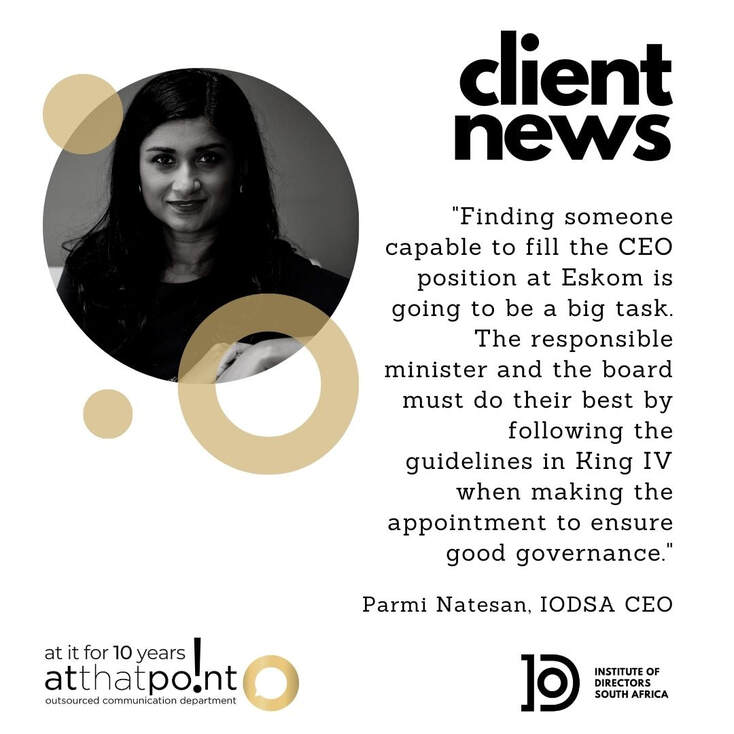 The current crisis at Eskom has a number of governance lessons for South Africa, one of which is the vital importance of proper succession planning for key senior positions, says Parmi Natesan, CEO of the Institute of Directors in South Africa (IoDSA). “The imminent departure of both the CEO and COO of Eskom in the next few months, with no obvious successors being communicated, raises concerns,” she says. “Now is really not the time for the two top positions—and many other senior management ones—to be vacant. In fact, Ms Natesan continues, the Eskom Statement on 14 December 2022 makes it clear that Mr De Ruyter’s agreement to stay on beyond the required 30-day notice period is welcome because there seems to be no planned successor for his position. The statement quotes the board chair as follows: “Mr De Ruyter has agreed to stay for an additional period beyond the stipulated 30-days’ notice to ensure continuity while we urgently embark on a search for his successor”. It remains to be seen whether there are plans in place for a succession to the COO, Jan Oberholzer, who is due to retire in April—a month after Mr De Ruyter leaves—and it is also unclear as to whether he will remain available to hand-over to a successor when one is appointed. King IV specifically states that the board should satisfy itself that there is succession planning for the CEO and other executive positions in place to provide continuity of executive leadership. Succession planning should be reviewed periodically and should provide for both succession in emergency situations and succession over the longer term. This should include the identification, mentorship and development of future candidates. The IoDSA has repeatedly said that the way the CEOs of key state-owned enterprises have been appointed were not in line with good governance as outlined in King IV. Too often, the powerful single shareholder bypasses the board in making the appointment. This leads to problems because the CEO is seen as a representative of the shareholder, and thus sometimes does not feel accountable to the board. Skewed reporting lines set the board and executive management up for conflict, with bad results for the organisation. “Finding someone capable to fill the CEO position at Eskom is going to be a big task. The responsible minister and the board must do their best by following the guidelines in King IV when making the appointment to ensure good governance,” she concludes. “Good governance is the foundation of good organisational performance—and the converse is also true.” ENDS MEDIA CONTACT: Stephné du Toit, [email protected], 084 587 9933, www.atthatpoint.co.za For more information on the IoDSA please visit: Website: www.iodsa.co.za Twitter: @The_IoDSA LinkedIn: Institute of Directors South Africa Company Page Facebook: Institute of Directors South Africa
0 Comments
 Recent events in both the public and private sectors are again highlighting the key role that proper succession planning plays in supporting any organisation’s sustainability, particularly when it comes to CEOs and governing-body chairs. Poor succession planning inevitably creates a leadership vacuum at both governing body and executive management level resulting in a loss of the longer term strategic focus. The impacts of this uncertainty can be dire, says Richard Foster, facilitator at the Institute of Directors in Southern Africa (IoDSA). Impacts can include a loss of performance delivery influenced by such factors as possible churn at the senior management level, the loss of market share to more focused competitors, severe reputational damage and erosion of investor and other key stakeholder confidence in both the governing body and senior management alike. “Because good governance relies on effective leadership, succession planning receives significant focus in King IV. In addition, its five sector supplements deal with the specific issues relating to succession planning in different contexts,” Mr Foster notes. The position is particularly complex when it comes to state-owned entities (SOEs) because certain appointments like the CEO and governing-body chair are typically mandated in legislation or founding documents. The shareholder thus plays a key role, and the process is not as easily aligned with what is considered governance best practice, he says. A similar situation exists in local government. One mark of the difficulties of proper succession planning at SOEs is the reliance on interim appointments. However, they inevitably create uncertainty unless they are well thought-through and the process is properly communicated to stakeholders. “One of the governing body’s primary functions is to create and oversee the implementation of strategy, implying a three-to-five-year, or even longer timeline. Interim appointments, by contrast, tend to be operationally focused pending a permanent appointment,” he says. King IV recommends that governing bodies should ensure succession plans exist for their own members, as well as for the CEO and executive management team. However, because succession planning is intimately connected with the appointment of these senior office-bearers, succession planning for SOEs is, as previously mentioned, more complex and challenging. Typically, the shareholder/executive authority (ultimately the government) has the power (or obligation) to appoint the chair and/or the CEO and/or other governing-body members. In its SOE Sector Supplement, King IV recommends that these appointments should be accomplished via a robust and transparent process that involves the governing body (the accounting authority) as much as possible to give effect to the aspirations of the relevant principle. “The processes for appointing CEOs or chairs at certain SOEs is sometimes questioned. The damage caused by unsuitable appointments is now plain, and both the organisations and the economy as a whole are affected,” he says. To align succession planning in SOEs better with governance best practice, the King IV SOE Sector Supplement recommends that the CEO’s letter of appointment should clearly state that the CEO is accountable to the governing body (rather than the executive authority i.e. shareholder), that the governing body and CEO jointly agree on how the CEO’s performance should be measured, and that the governing body has the primary responsibility for firing the CEO. “It is encouraging that Government seems to have now recognised that good corporate governance requires ethical and effective leadership, and that increased focus appears to have been placed on the succession planning and attendant appointment process,” Mr Foster concludes. “The consequences of not following the recommended practices of good governance are now plain to see.” ENDS MEDIA CONTACT: Idéle Prinsloo, 082 573 9219, [email protected], www.atthatpoint.co.za For more information on the IoDSA please visit: Website: www.iodsa.co.za Twitter: @The_IoDSA LinkedIn: Institute of Directors in Southern Africa Company Page |
Archives
July 2024
Categories
All
|

 RSS Feed
RSS Feed